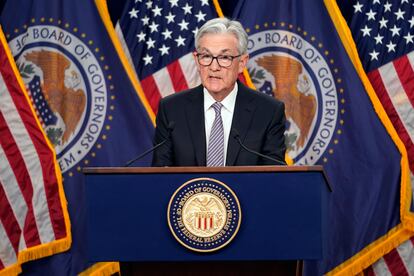The remarkably resilient US economy
Despite high interest rates and international conflicts, strong consumption enables the United States to avoid recession


Following the Thanksgiving festivities, American consumers eagerly flocked to brick-and-mortar and online stores to embark on a shopping spree. Initial estimates indicate that spending on Black Friday and Cyber Monday shattered previous records. With historically low unemployment rates and some savings left over from the pandemic, household spending has enabled the U.S. economy to exceed expectations time and time again. Despite high interest rates, international conflicts, banking problems, labor strikes and other obstacles, the U.S. economy has been surprisingly robust. “The biggest surprise for the U.S. economy this year has been its remarkable resilience and especially its growth,” said PIMCO economist Tiffany Wilding, who nevertheless noted some risks for the coming year.
The U.S. Department of Commerce’s Bureau of Economic Analysis (BEA) recently increased its estimate for third-quarter gross domestic product (GDP) growth to an impressive annualized pace of 5.2% (quarterly growth of about 1.3%). This is the highest growth rate since the end of 2021. Additionally, inflation has dropped to 3.2% and the unemployment rate has remained below 4% for 21 months, marking the longest streak in 60 years.
President Joe Biden joked a few months ago about all the economic gloom. “I’ve been hearing every month that there’s gonna be a recession next month — I don’t think so,” he said in June. The Federal Reserve and many other economists expected a recession this year, but things have played out differently. “Few anticipated that interest rates could be raised so rapidly without triggering a U.S. economic downturn or, more significantly, without a massive failure like the LTCM [Long Term Capital Management hedge fund] collapse in 1998,″ said Yves Bonzon, head of investments at Swiss private bank Julius Baer.
Wilding explains that the U.S. fiscal response to the pandemic was more aggressive compared to other developed economies. The excess savings from substantial stimulus payments and reduced spending during confinement have acted as “unexpectedly strong shock absorbers.” Wilding also noted improvements on the supply side, such as the influx of working-age immigrants and the corresponding downward pressure on wages.

Roadblocks ahead
But perhaps all the bad omens have only been postponed. After a strong summer, experts suggest that the economy is starting to slow down, with some believing that the risk of recession remains high in 2024. In the third quarter, growth primarily resulted from increased consumer spending, inventory stockpiling and public spending. However, these factors are expected to diminish in the upcoming quarters, according to Michael Pearce, chief U.S. economist at Oxford Economics. “That excess pandemic savings has boosted growth this year, but it’s fading,” said Wilding.
Wilding’s analysis of similar episodes around the world over the past 70 years indicates that aggressive tightening of monetary policy driven by high inflation has historically led to recessions 90% of the time. “Based solely on historical experience, we are now in a period where the likelihood of recession is higher than normal,” she said. “How likely? It’s a coin flip.” Wilding believes that markets are being too complacent by underestimating this risk.
“GDP forecasting models predict a significant moderation in economic activity in the fourth quarter,” said Federal Reserve advisor Christopher Waller at a recent American Enterprise Institute event. Waller noted a 2.1% growth forecast in the fourth quarter, consistent with the first half of the year but less than half of the third quarter growth. “One major factor that contributed to the GDP increase during the third quarter was inventory stockpiling, which can vary significantly from one quarter to another,” cautioned Waller.
“We’re still unsure of the full impact of tightening monetary policy and financial conditions on economic activity and inflation,” said Michelle Bowman, another Federal Reserve advisor. Bowman noted that interest rate increases primarily affected loans to small businesses and corporate debt, and have led to slightly higher delinquency on personal credit card debt and auto loans. However, cash buyers in the housing market have mitigated interest rates sensitivity in real estate. “Many households still have excess savings and are benefiting from low-rate mortgages,” she added.
Bonzon acknowledges that interest rate increases have had minimal effect, even in sectors highly sensitive to such changes, like residential real estate. “After a significant wealth setback in 2008, U.S. households spent the next 10 years rebuilding,” he said. “Then came the direct government stimulus payments and asset inflation during the pandemic, which further bolstered their finances.” According to J.P. Morgan Asset Management, Americans now hold $174 trillion in assets, up from $85 trillion in 2007 before the global financial crisis. Their debt stands at $20 trillion, with two-thirds being mortgages at an average fixed rate of 3%. “The interest rate hikes have had a minimal impact on American households,” said Bonzon.
The possibility of a new interest rate hike by the Federal Reserve in December has been largely disregarded by the markets. Instead, attention is shifting towards the timing of rate cuts, as evidenced by the significant increase in Treasury bond prices (resulting in falling yields) and the recent weakening of the dollar to its lowest levels in the past three months. The Federal Reserve’s meeting on December 13 is expected to provide insights into its outlook for 2024, which is also an election year. But nothing is guaranteed in the world of economic forecasting.
Sign up for our weekly newsletter to get more English-language news coverage from EL PAÍS USA Edition
Tu suscripción se está usando en otro dispositivo
¿Quieres añadir otro usuario a tu suscripción?
Si continúas leyendo en este dispositivo, no se podrá leer en el otro.
FlechaTu suscripción se está usando en otro dispositivo y solo puedes acceder a EL PAÍS desde un dispositivo a la vez.
Si quieres compartir tu cuenta, cambia tu suscripción a la modalidad Premium, así podrás añadir otro usuario. Cada uno accederá con su propia cuenta de email, lo que os permitirá personalizar vuestra experiencia en EL PAÍS.
¿Tienes una suscripción de empresa? Accede aquí para contratar más cuentas.
En el caso de no saber quién está usando tu cuenta, te recomendamos cambiar tu contraseña aquí.
Si decides continuar compartiendo tu cuenta, este mensaje se mostrará en tu dispositivo y en el de la otra persona que está usando tu cuenta de forma indefinida, afectando a tu experiencia de lectura. Puedes consultar aquí los términos y condiciones de la suscripción digital.








































